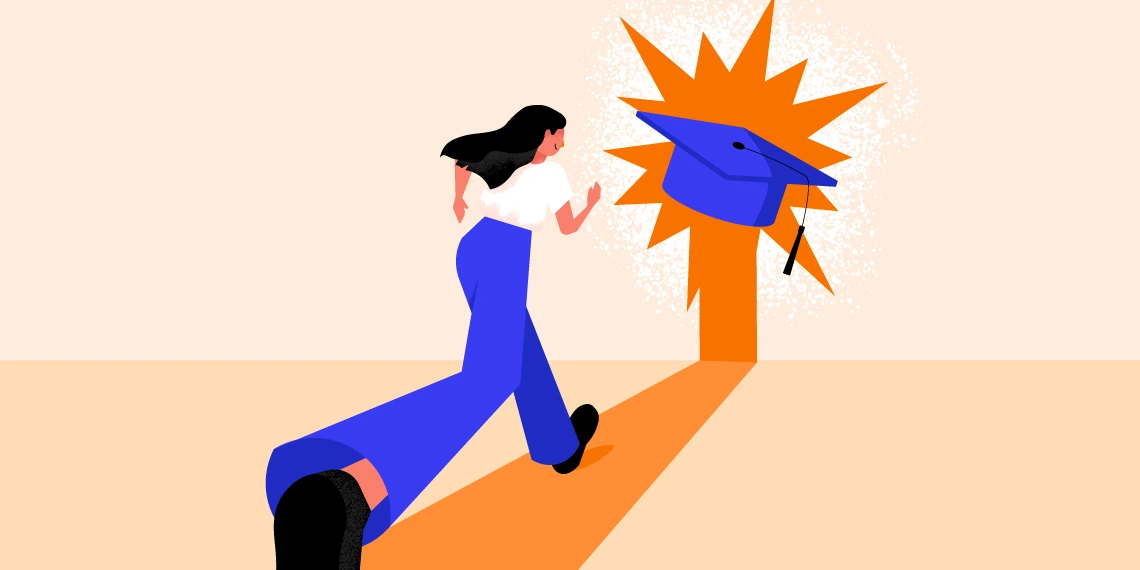Going the Distance: Harnessing Athletic Mindsets for Academic Success in Higher Education
This article challenges the stereotypes surrounding student-athletes, arguing that their unique characteristics can be leveraged to drive exceptional academic performance.

Picture this: A student-athlete, exhausted from a 5 AM practice, slumps into a classroom chair. Their professor eyes them warily, assuming they're unprepared or uninterested. Sound familiar? It should be because student-athletes are often the forgotten demographic in America's higher education system.
Let's face it: We've all heard the stereotype "Dumb jocks." "Academically unmotivated." "Just here for the sport." But here's the kicker – these perceptions aren't just unfair, they're flat-out wrong. They completely miss the goldmine of potential sitting right there in those classroom seats.
So, here's the million-dollar question: How do we flip the script? How can we take that same fire that drives an athlete to push through that last rep, run that extra mile, or nail that perfect play, and ignite it in the classroom?
As a former collegiate runner who now juggles being a multilingual instructional designer and the owner of an indoor sports facility, I've got a unique perspective on this. I've been that bleary-eyed athlete in the classroom, and now I'm on the other side, designing learning experiences. And let me tell you, the parallels between athletic training and academic success? They're not just similar – they're practically twins.
Think about it. The discipline it takes to wake up at dawn for practice. The resilience to bounce back from a tough loss. The focus needed to execute a complex play. These aren't just sports skills – they're life skills. Academic skills. And they're just waiting to be tapped.
This isn't just theory – I've seen it in action. I've watched athletes transform their academic performance using the same mindset that made them stars on the field. And that's what this article is all about. We will dive into practical, actionable strategies that educators, instructional designers, and administrators can use to harness student-athletes unique strengths of student-athletes.
By the time you finish reading, you'll have a game plan to not only shatter those outdated stereotypes but also to create learning experiences that resonate with all students, athletes or not. Because let's be real – who couldn't benefit from a little more of that athletic drive and determination in their academic life?
Ready to change the game? Let's dive in.
The Athlete's Mindset: Three Key Characteristics
Student-athletes possess a unique set of characteristics that, when properly channeled, can lead to exceptional academic performance. Let's explore these traits through the lens of various sports:
Motivation
In the world of athletics, motivation is the fuel that drives performance. Take, for example, a swimmer preparing for the Olympics. Their motivation stems from a clear, tangible goal: shaving seconds off their time to qualify for the games. This laser-focused motivation translates seamlessly to academics when students can visualize their educational goals with the same clarity.
Dedication
The dedication of athletes is legendary. Consider a basketball player who spends countless hours perfecting their free throw, repeating the same motion thousands of times until it becomes second nature. This level of commitment is a powerful tool when applied to studying.
Grit
Angela Duckworth's concept of grit is exemplified in the world of sports. A gymnast who falls during a routine but gets back up to finish strong embodies this trait. In academics, grit manifests as the perseverance to tackle challenging subjects or bounce back from a poor grade.
A Personal Journey: From the Track to the Classroom
As a first-generation student-athlete, I arrived at university feeling underprepared for academic rigors. My athletic scholarship in cross country meant I intimately understood the physical demands of my sport – daily 5 AM runs, afternoon workouts, and weekly mileage ranging from 35 to 60 miles. The training rhythm was ingrained in my body and mind, but I struggled to find a similar rhythm in my studies.
It wasn't until someone pointed out the parallel between my athletic dedication and potential academic success that I had an epiphany. I realized that if I applied the same effort, strategy, and mindset to my studies as I did to running, I could achieve anything academically.
This realization transformed my approach to learning. I began to see each course as practices and races, with milestones and checkpoints along the way. Just as I broke down a long run miles into manageable segments, I started chunking course content into digestible parts. This strategy not only made learning less overwhelming but also allowed me to track my progress and stay motivated. But here's the real game-changer: visualizing the end goal. In running, I always knew what crossing the finish line looked like. We always ran the route or reviewed the map the day before. So why not in academics? Knowing and planning for a strong finish, whether it was an essay or a project, knowing the expectations, and mentally mapping out the steps to get there made the difference.
Bridging the Gap: Athletic Mindset in Academic Settings
To truly harness student-athletes potential of student-athletes, we must create learning experiences that resonate with their athletic training. Here are five key intersections between athletic and academic success, along with recommendations for learning experience designers and faculty:
Goal Setting and Milestone Tracking
Athletic Parallel: Athletes constantly set and work towards specific goals, whether it's improving their sprint time or increasing their bench press weight.
Academic Application: Implement a goal-setting system in courses where students set academic targets at the beginning of the semester and track their progress throughout. Use digital platforms to create visual representations of their academic "personal bests."
- The Notion app free student account is a great place to start. The school templates offer a space for students to personalize and organize school, life, and goals.
- The Notion app free student account is a great place to start. The school templates offer a space for students to personalize and organize school, life, and goals.
Consistent Practice and Feedback Loops
Athletic Parallel: Athletes engage in daily practice with immediate feedback from coaches to refine their techniques.
Academic Application: Design courses with frequent, low-stakes assessments that provide immediate feedback. Utilize adaptive learning strategies or technologies that adjust content difficulty based on student performance, mimicking the progressive challenge of athletic training.
A few examples of adaptive learning strategies include:
- Personalized Learning Paths
- Micro-Learning Modules
- Competency-Based Progression
- Real-Time Feedback and Adjustment
- Gamification and Competitive Elements
- Peer Learning and Coaching
- Data-Driven Instruction
Team-Based Learning and Peer Support
Athletic Parallel: Team sports rely heavily on collaboration and peer support for success.
Academic Application: Incorporate more group projects and peer-review sessions in coursework. Create study groups that mirror athletic team dynamics, fostering a sense of accountability and shared success.
Visualization and Mental Preparation
Athletic Parallel: Athletes use visualization techniques to prepare for competitions and improve performance. Depending on the sport, this might include finishing a race strong, completing a successful gymnastics routine, and visualizing how you and your team will run a play in basketball or football.
Academic Application: Teach students to use visualization techniques for academic success. This could involve imagining themselves successfully completing an exam or presenting a project with confidence. Or, when working on a portfolio, imagining what the end result will look like and then defining what steps they can take to achieve it.
Recovery and Balance
Athletic Parallel: Athletes understand the importance of rest and recovery in their training regimen.
Academic Application: Educate students on the importance of cognitive rest and stress management. Integrate mindfulness practices into the curriculum and provide resources for maintaining mental health alongside academic pursuits.
Misty Buck shares 20 popular mindfulness practices for athletes. Below are a few of my favorites:
- Mindful breathing
- Mantra meditation
- Walking meditation
- Visualization
The Coach-Instructor Connection
The role of an instructor can be reimagined to align more closely with that of a coach. Like athletic coaches, instructors might consider the following:
- Provide personalized feedback and encouragement
- Help students identify and leverage their strengths
- Create a supportive yet challenging learning environment
- Celebrate incremental progress and achievements
For online learning environments, consider implementing virtual "coaching sessions" where instructors meet one-on-one with students to discuss progress and strategies for improvement.
By recognizing and leveraging student-athletes' inherent strengths, we can transform their academic experiences and outcomes. The same motivation, dedication, and grit that propel them to athletic excellence can be channeled into academic success. As instructional designers, educators, and administrators, it's our responsibility to consider the diversity of our student demographics and create learning environments that also resonate with the athletic mindset.
By bridging the gap between athletic training and academic learning, we not only dispel myths about student-athletes but also unlock their full potential as scholars. The result is a win-win scenario: athletes who excel both on the field and in the classroom are fully prepared for success in their future careers and live beyond sports.


